- Home
- Patricia Cornwell
Red Mist Page 2
Red Mist Read online
Page 2
How emotional this must be for Kathleen Lawler. I suspect she has thought of little else of late. For people like her, I’m the final connection to those they’ve lost or killed. I’m the surrogate for their dead.
2
Tara Grimm is the warden, and her office at the end of a long blue hallway is furnished and decorated by the inmates she keeps.
The desk, coffee table, and chairs are lacquered honey-colored oak and have a sturdy shape and for me a certain charm because I almost always would rather see something made by hand, no matter how rustic. Vines with heart-shaped variegated leaves crowd planters in windows and trail from them to the tops of homebuilt bookcases, draping over the sides like bunting and tumbling in tangled masses from hanging baskets. When I comment on what a green thumb Tara Grimm must have, she informs me in a measured melodious voice that inmates tend to her indoor plants. She doesn’t know the name of the creepers, as she calls them, but they could be philodendron.“Golden pothos.” I touch a marbled yellow-green leaf. “More commonly known as devil’s ivy.”
“It won’t stop growing, and I won’t let them cut it back,” she says from the bookcase behind her desk, where she is returning a volume to a shelf, The Economics of Recidivism.“Started out with one little shoot in a glass of water, and I use it as an important life lesson all these women chose to ignore along the path that landed them in trouble. Be careful what takes root or one day it will be all there is.” She shelves another book, The Art of Manipulation.“I don’t know.” She scans vines festooning the room. “I suppose it’s getting a bit overwhelmed in here.”
The warden is somewhere in her forties, I deduce, tall and svelte and strangely out of place in her scoop-neck black dress that flows mid-calf with a gold coin lariat wrapped around her neck, as if she paid special attention to her appearance this day, perhaps because of the men just leaving, visitors, possibly important ones. Dark-eyed, with high cheekbones and long black hair swept up and back, Tara Grimm doesn’t look like what she does, and I wonder if the absurdity occurs to her or others. In Buddhism, Tara is the mother of liberation, which one might argue this Tara certainly is not. Although her world is grim.
She smoothes her skirt as she sits down behind her desk and I take a straight-backed chair across from her. “Mainly I needed to go over anything you might intend to show Kathleen,” she informs me of the reason I was directed to her office. “I’m sure you know the routine.”
“It’s not routine for me to visit people in prison,” I reply. “Unless it’s in the infirmary or worse.” What I mean is if an inmate needs a forensic physical examination or is dead.
“If you’ve brought reports or other documents, anything to go over with her, I need to approve them first,” she lets me know, and I tell her again that I’ve come as a friend, which is legally correct but not literally true.
I am no friend to Kathleen Lawler and will be deliberate and cautious as I extract information, encouraging her to tell me what I want to know without letting on I care. Did she have contact with Jack Fielding over the years, and what happened during episodes of freedom when she was on the outside? An ongoing sexual affair between a female offender and her younger male victim certainly has occurred in other cases I’ve researched, and Kathleen was in and out of prison the entire time I knew Jack. If there were continued romantic interludes with this woman who molested him as a boy, I wonder if the timing of them might be related to those periods when he went haywire and vanished, prompting me to find him and eventually hire him back.
I want to know when he first discovered that Dawn Kincaid was his daughter and why he recently connected with her in Massachusetts, allowing her to live in his house in Salem, and for how long, and was this related to his walking out on his wife and family? Did Jack know he was being altered by dangerous drugs, or was that part of Dawn’s sabotage, and was he aware his behavior was increasingly erratic, and whose idea was it for him to engage in illegal activities at the Cambridge Forensic Center, the CFC, while I was out of town?
I can’t predict what Kathleen might know or say, but I will handle the conversation the way I’ve planned and rehearsed with my lawyer, Leonard Brazzo, and give her nothing in return. She can’t be required to testify against her own daughter and wouldn’t be credible in court, but I won’t reveal a single fact that could find its way back to Dawn Kincaid and be used to help her defense.
“Well, I didn’t suppose you’d bring anything relating to those cases,” Tara Grimm says, and I sense she is disappointed. “I confess to having a lot of questions about what went on up there in Massachusetts. I admit I’m curious.”
Most people are. The Mensa Murders, as the press has dubbed homicides and other vicious acts involving people with genius or near-genius IQs, are about as grotesque as anything one might ever conjure up. After more than twenty years of working violent deaths, I still haven’t seen it all.
“I won’t be discussing any investigative details with her,” I tell the warden.
“I’m sure Kathleen will be asking you, since it is her daughter we’re talking about, after all. Dawn Kincaid supposedly killed those people and then tried to murder you, too?” Her eyes are steady on mine.
“I won’t be discussing any details with Kathleen about those cases or any cases.” I give the warden nothing. “That’s not why I’m here,” I reiterate firmly. “But I did bring a photograph I’d like her to have.”
“If you’ll let me see it.” She reaches out a fine-boned hand with perfectly manicured nails painted deep rose as if she just had them done, and she wears many rings and a gold metal watch with a crystal bezel.
I give her the plain white envelope I’d tucked into my back pocket, and she slides out a photograph of Jack Fielding washing his prized ’67 cherry-red Mustang, shirtless and in running shorts, grinning and glorious, when he was captured on camera some five years ago, between marriages and deteriorations. Although I didn’t do his autopsy, I’ve dissected his existence these five months since his murder, in part trying to figure out what I could have done to prevent it. I don’t believe I could have. I was never able to stop any self-destruction of his, and as I look at the photograph from where I sit, anger and guilt spark, and then I feel sad.
“Well, I guess that’s fine,” the warden says. “He was easy on the eyes, I’ll give him that. One of these obsessive bodybuilders, good Lord. How many hours in a day would it take?”
I look around at framed certificates and commendations on her walls because I don’t want to look at her looking at that photograph, uncertain why it’s bothering me so much. Maybe it’s harder to see Jack through a stranger’s eyes. Warden of the Year. Outstanding Merit. Distinguished Service Award. Meritorious Service Award, Continuing Excellence. Supervisor of the Month.Some of them she’s won more than once, and she has a bachelor’s degree cum laude from Spalding University in Kentucky, but she doesn’t sound like a native, more like Louisiana, and I ask her where she’s from.
“Mississippi, originally,” she says. “My father was the superintendent of the state penitentiary there, and I spent my early years on twenty thousand acres of delta land as flat as a pancake, with soybeans and cotton that the inmates farmed. Then he got hired by Louisiana State Penitentiary in Angola, more farmland far away from civilization, and I lived right there on the grounds, which might seem strange. But I didn’t mind living in the lap of my father’s work. Amazing what you get used to as if it’s normal. It was his recommendation that the GPFW be built out here in the middle of scrubland and swamps, and that the women take care of it and cost the taxpayers as little as possible. I guess you could say that prisons are in my blood.”
“Your father worked here at some point?”
“No, he never did.” She smiles ironically. “I can’t imagine my father overseeing two thousand women. He would have been a bit bored with that, although some of them are a whole lot worse than the men. He was sort of like Arnold Palmer giving advice about golf-course design, no one better, de
pending on your vision, and he was progressive. A number of correctional institutions called upon him for advice. Angola, for example, has a rodeo stadium, a newspaper, and a radio station. Some of the inmates are celebrated rodeo riders and experts in leather, metal, and woodworking design that they’re allowed to sell for their own profit.” She doesn’t say all this as if she necessarily thinks it’s a good thing. “My worry about these cases you have up north is did they get everyone involved?”
“One would hope.”
“At least we know for sure Dawn Kincaid is locked up, and I hope she stays locked up. Killing innocent people for no good reason,” the warden says. “I hear she’s got mental problems because of stress. Imagine that. What about the stress she’s caused?”
Some months ago, Dawn Kincaid was transferred to Butler State Hospital, where doctors will determine whether she is competent to stand trial. Ploys. Malingering. Let the games begin. Or as my chief investigator, Pete Marino, puts it, she got caught and caught a case of the crazies.
“Hard to imagine she was all on her own when she was coming up with ways to sabotage and destroy innocent lives, but the worst is that poor little boy.” Tara is talking about what is none of her business, and I have no choice but to let her. “Killing a helpless child who was playing in his backyard while his parents were right there inside the house? There’s no forgiveness for harming a child or an animal,” she says, as if harming an adult might be acceptable.
“I was wondering if it would be all right for Kathleen to keep the photograph.” I don’t verify or refute her information. “I thought she might like to have it.”
“I suppose I can’t see any harm in it.” But she doesn’t seem sure, and when she reaches across her desk to hand the photograph back to me, I catch what is in her eyes.
She’s thinking, Why would you give her a picture of him?Indirectly, Kathleen Lawler is the reason Jack Fielding is dead. No, not indirectly,I think, as anger simmers. She had sex with an underage boy, and the child they produced grew up to be Dawn Kincaid, his killer. That’s about as direct as anything needs to get.
“I don’t know what Kathleen has seen that’s recent,” I offer as an explanation, returning the photograph to its envelope. “It’s an image I choose to remember him by, the way he was in better times.”
I can’t imagine Kathleen looking at this photograph and not opening up to me. We’ll see who manipulates whom.
“I don’t know how much you were told about why I moved her into protective custody,” Tara says.
“I simply know that she has been.” My answer is intentionally vague.
“Mr. Brazzo didn’t explain?” She seems dubious as she folds her hands on top of her tidy square oak desk.
Leonard Brazzo is a criminal trial lawyer, and the reason I need one is that when Dawn Kincaid’s attempt on my life goes to trial, I don’t intend to entrust my welfare to some overworked or green assistant U.S. attorney. I have no doubt the team of lawyers who have taken her on pro bono will make my being attacked inside my own garage somehow excusable. They’ll claim it was my fault she ambushed me from behind in the pitch dark. I’m alive because I was bizarrely lucky, and as I sit inside Tara Grimm’s ivy-infested office, it bothers me more than I care to admit that I’m really not responsible for saving myself.
“As I understand it, she’s been moved into protective custody for her own safety,” I reply, as I envision the level-four-A camouflage vest with its inserted Kevlar-ceramic plates. I remember the body armor’s tough nylon texture, the new smell of it, and its weight as I draped it over my shoulder inside my dark, frigid garage that night after retrieving it from the backseat of the SUV.
“Seems like my moving her to Bravo Pod might have made you hesitant about what you might be walking into down here in Savannah,” Tara comments. “Seems like you might not be inclined to seek out anything unsafeafter what you’ve been through.”
I envision the blizzard of intense white specks as small as pollen on the MRI scan of the first victim Dawn Kincaid stabbed with an injection knife. Bright white particles densely concentrated around a buttonhole wound and blasted deep inside the organs and soft tissue structures of the chest. Like a bomb going off internally. If she’d finished what she’d started when she came after me with that same weapon, I would have been dead before I hit the ground.
“Not that I understand why you were wearing body armor at your own house.” The warden probes because she can.
I don’t offer that part of my job with the Department of Defense is medical intelligence, and that General Briggs wanted my opinion of the latest level of body armor developed for female troops. I happen to know for a fact that the vest can stop a steel blade. Luck, dumb luck, and I remember being shocked by what I saw in the mirror after it was over. My red-tinted face. My red-tinted hair. For an instant I smell the iron smell and hear the hissing red mist as it landed warmly, wetly, all over me inside my cold, dark garage.
“I understand the dog was out there in the garage with you when it happened, if what’s been in the news is true. How is Sock?” I hear the warden say, as I look down at my hands. My clean hands with their functional unpolished short squared nails. I take a deep breath and concentrate on any odors in the room. No iron bloody smell, just the hint of Tara Grimm’s perfume. Estée Lauder. Youth-Dew.
“He’s doing quite well.” I focus on her again and wonder if I missed something. How did we get on the subject of a rescued greyhound?
“So you still have him?” She looks steadily at me.
“Yes, I do.”
“I’m glad to hear it. He’s a very good dog. But they all are. Just as sweet as they can be, and I know Kathleen didn’t want to give him up to just anyone and is hoping she’ll get him back when she’s out.”
“When she’s out?” I ask.
“Dawn adopted Sock because Kathleen didn’t want anyone else to have him, she loved that dog so much,” Tara says. “Good to animals, I’ll give her credit for that, at least, and knowing all this should have alerted you that the two of them have a connection, an alliance. Kathleen and Dawn, even though Kathleen will lead you to think otherwise, as you’re about to find out. Since I’ve been the warden here, Dawn’s been a fairly frequent visitor, coming to see her mother three or four times a year, making deposits in her commissary account. Of course, that’s stopped. The two wrote to each other, but the police took those letters, although it doesn’t prevent the two of them from communicating now, one inmate writing another. You probably know all that.”
“I’d have no reason to.”
“Kathleen lies about it now that Dawn’s in trouble. Doesn’t want any guilt by association when it comes to someone who might be in a position to help her. You, for example. Or a prominent lawyer. Kathleen will say what she thinks is to her advantage.”
“What do you mean ‘when she gets out’?” I repeat.
“You know, everybody’s wrongly convicted this day and age,” she says.
“I didn’t realize there’s any suggestion Kathleen Lawler might have been.”
“She won’t get Sock back unless he lives to be a very old dog,” Tara Grimm says, as if she’ll make sure of it. “I’m glad you’re keeping him. I’d hate for one of the rescues we train here to be homeless again or end up in the wrong hands.”
“I can assure you Sock won’t ever be homeless or in the wrong hands.” I’ve never had a pet so bonded to me, following me everywhere like a needy shadow.
“Most of our greyhounds come from a racetrack in Birmingham, the same one Sock came from,” she says. “They retire them, and we take them so they aren’t euthanized. It’s good for the inmates to be reminded that life is a God-given gift, not a God-given right. It can be given or taken away. When you acquired Sock, you didn’t know he belonged to Dawn Kincaid, I assume.”
“He was inside a back room of an unheated house in Salem in the winter and had no food.” She can interrogate all she wants. I’m not going to tell her much. “I too
k him home with me until we could figure out what to do with him.”
“And then Dawn showed up to get him,” the warden says. “She came to your house that same night to get her dog back.”
“It’s interesting if that’s the story you’ve heard,” I reply, and I wonder where she might have gotten an absurd idea like that.
“Well, your interest in Kathleen is a mystery to me,” she says. “I wouldn’t think it was the wisest move for someone in your position. Now, I said so to Mr. Brazzo, but of course he wasn’t going to elaborate on your real motive for agreeing to meet with Kathleen. Or why you’ve been so kind to her.”
I have no idea what she means.
“Let me be a little more blunt,” the warden says. “At certain times during the day, inmates with e-mail privileges are allowed to use the computer lab, and whatever they send to pen pals or receive from them has to go through our prison e-mail system, which is monitored and has filters. I know what she’s e-mailed to you over recent months.”
“Then you’re also aware I never answered.”
“I’m aware of all inmate communications to and from the outside world, whether it’s e-mail or letters written on stationery and sent by post.” She pauses, as if what she just said is supposed to mean something to me. “I have an idea what you’re after and why you’re being friendly and accessible with Kathleen. You want information. What should concern you is who’s really behind Kathleen’s invitation. And what that person might want. I’m sure Mr. Brazzo told you the troubles she’s had.”

 Blow Fly
Blow Fly Unnatural Exposure
Unnatural Exposure The Bone Bed
The Bone Bed Book of the Dead
Book of the Dead Flesh and Blood: A Scarpetta Novel (Scarpetta Novels Book 22)
Flesh and Blood: A Scarpetta Novel (Scarpetta Novels Book 22)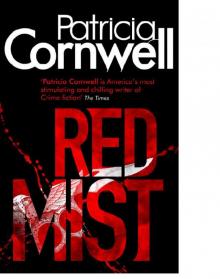 Red Mist
Red Mist Cruel & Unusual
Cruel & Unusual Hornet's Nest
Hornet's Nest Four Scarpetta Novels
Four Scarpetta Novels Scarpetta's Winter Table
Scarpetta's Winter Table Isle of Dogs
Isle of Dogs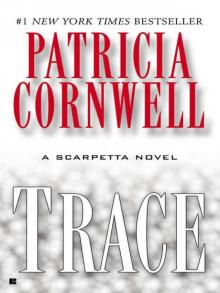 Trace
Trace Postmortem
Postmortem Body of Evidence ks-2
Body of Evidence ks-2 Southern Cross
Southern Cross All That Remains
All That Remains Point of Origin
Point of Origin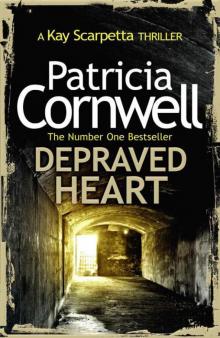 Depraved Heart
Depraved Heart Ruth, a Portrait: The Story of Ruth Bell Graham
Ruth, a Portrait: The Story of Ruth Bell Graham From Potter's Field
From Potter's Field Flesh and Blood
Flesh and Blood Dust
Dust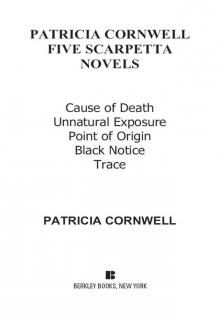 The Body Farm
The Body Farm Port Mortuary
Port Mortuary Quantum
Quantum Portrait of a Killer: Jack the Ripper - Case Closed
Portrait of a Killer: Jack the Ripper - Case Closed Spin (Captain Chase)
Spin (Captain Chase) Cause of Death
Cause of Death The Scarpetta Factor
The Scarpetta Factor Predator
Predator Scarpetta 18 - Port Mortuary
Scarpetta 18 - Port Mortuary Trace ks-13
Trace ks-13 Portrait of a Killer
Portrait of a Killer Cruel and Unusual ks-4
Cruel and Unusual ks-4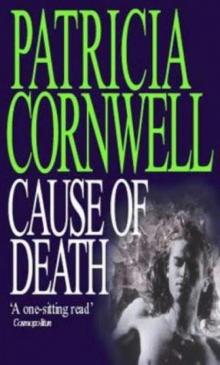 Cause Of Death ks-7
Cause Of Death ks-7 Dust ks-21
Dust ks-21 At Risk wg-1
At Risk wg-1 The Last Precinct ks-11
The Last Precinct ks-11 Book of the Dead ks-15
Book of the Dead ks-15 All That Remains ks-3
All That Remains ks-3 Ruth, a Portrait
Ruth, a Portrait Scarpetta's Winter Table (kay scarpetta)
Scarpetta's Winter Table (kay scarpetta) From Potter's Field ks-6
From Potter's Field ks-6 Scarpetta
Scarpetta Isle of Dogs jhabavw-3
Isle of Dogs jhabavw-3 Hornet's Nest jhabavw-1
Hornet's Nest jhabavw-1 The Body Farm ks-5
The Body Farm ks-5 Blow Fly ks-12
Blow Fly ks-12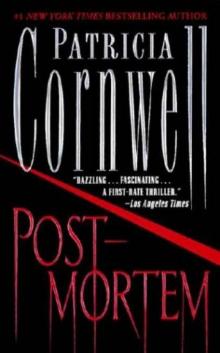 Post Mortem
Post Mortem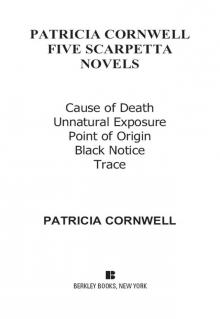 Five Scarpetta Novels
Five Scarpetta Novels Chasing the Ripper (Kindle Single)
Chasing the Ripper (Kindle Single) Point of Origin ks-9
Point of Origin ks-9 Port Mortuary (2010)
Port Mortuary (2010) Unnatural Exposure ks-8
Unnatural Exposure ks-8 Southern Cross uhabavw-2
Southern Cross uhabavw-2 The Bone Bed ks-20
The Bone Bed ks-20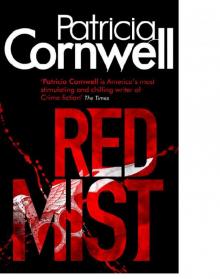 Red Mist ks-19
Red Mist ks-19 Port Mortuary (2010) ks-18
Port Mortuary (2010) ks-18 Predator ks-14
Predator ks-14